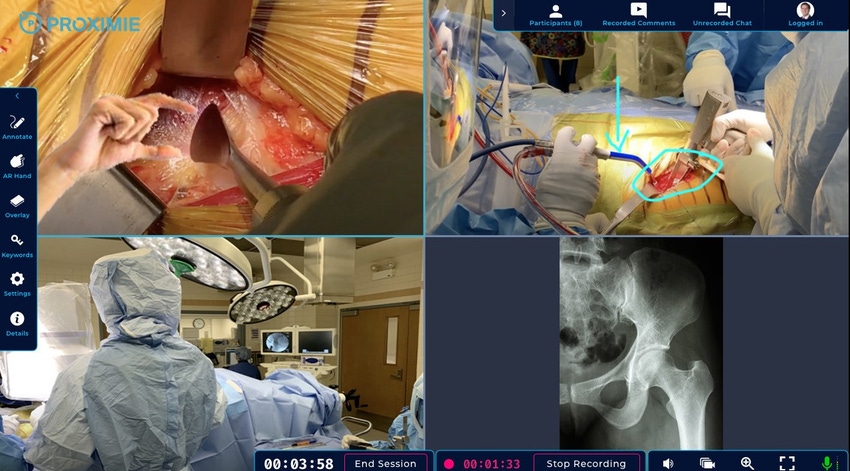Vodafone partners with Proximie for 5G and IoT powered healthcare
Health technology platform Proximie has partnered with Vodafone Business to digitise operating rooms with 5G, IoT and edge computing installations.
January 11, 2022

Health technology platform Proximie has partnered with Vodafone Business to digitise operating rooms with 5G, IoT and edge computing installations.
Proximie as a platform is supposed to ‘digitise operating and diagnostic rooms’ – and the partnership with Vodafone is supposed to help accelerate its expansion plans with the latter providing 5G, IoT and edge computing infrastructure.
It’s a little tricky to pin down exactly what the manifestation of this partnership will actually be, but apparently it will ‘advance access’ to the firm’s digital surgical solutions for both patients and healthcare professionals. Efficiency and better training are pegged as two key outcomes.
Proximie claims to be creating a global network of operating rooms interconnected by the world’s best clinicians, in which ‘as many incisions as possible are informed by artificial intelligence’, and professionals are given access to real-time diagnostics, data, and analysis.
Hospital staff can interact with any connected operating room in the world to ‘enable, accelerate and improve surgical mentoring, proctoring, and technical expertise’ – which essentially sounds like it allows them to compare notes on procedures.
“Proximie has started 2022 with huge momentum with this latest partnership announcement,” said Dr Nadine Hachach-Haram, Founder and CEO of Proximie. “Having the best connectivity is imperative for delivering digital health services at scale, so we are thrilled to partner with Vodafone Business to leverage its 5G capabilities and cutting edge technologies such as edge computing.
“Building on our existing relationship will accelerate the roll-out of our platform in the UK and across Europe. We will be able to provide connected surgical care to a wider audience and continue delivering impact by sharing the best clinical practice and ultimately saving lives.”
Mark Allinson, Business Development Director, Vodafone Business added: “This partnership with Proximie cements our existing relationship and will be an enabler of their connected surgical care solution through increased access to Vodafone’s technologies and platforms.
“We understand the critical role technology will play in transforming healthcare and, by bringing together Proximie’s expertise and Vodafone’s capabilities, we can accelerate the innovation needed to the drive efficiencies and improve patient care.”
The release cites a figure that 2.4 million operations will have been cancelled by 2021 year-end, and a report by the British Medical Association which forecasts that by 2043, medical workforce shortages could be up to over 80,000 doctors.
Indeed, healthcare services all over the world have been battered over the last two years by covid, so any potential technological solution that could make them more effective or efficient in providing treatments should be welcomed with open arms.
So it’s quite frustrating when what could be significant solutions to all this are routinely explained in quite vague terms, a criticism you could of course also make of the many ethereal 5G or smart-whatever use cases.
It’s been a point of our commentary for years now – how the healthcare sector sometimes throws up some of the more bizarre use cases for 5G. It’s often difficult to tell the difference between back of a cigarette packet sketches of technological trajectory and genuinely useful hospital advancements. Vodafone and Proximie still have some work to do to prove their partnership will yield the latter.
Most of this release seems to be essentially describing some form of best practice information sharing, something most of us assumed was happening anyway between hospitals. Even using the word ‘technology’ to explain how something is apparently being improved doesn’t mean a whole lot on its own.
All in all we are of course pro-innovation and in principle leveraging 5G speeds, IoT gadgetry and edge computing installations to do anything better, certainly save lives, sounds great.
What we would say is that firms that find themselves in what could be described as the ‘digital transformation’ space, and particularly if they are in the business of convincing monolithic organisations like the NHS to change course, could perhaps do a better job of being specific as to what it is they are saying is obsolete or broken, and exactly what it is they are suggesting should replace it.
About the Author(s)
You May Also Like











_1.jpg?width=300&auto=webp&quality=80&disable=upscale)


.png?width=800&auto=webp&quality=80&disable=upscale)